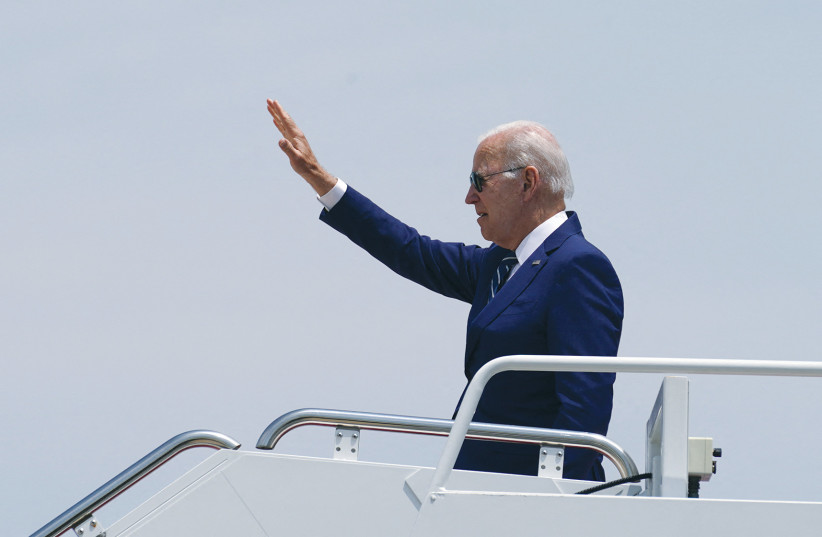On a hot summer June day, then-president Richard Nixon stepped down the stairs of Air Force One onto the tarmac of Israel’s Ben-Gurion Airport. Israel was reeling from its latest war less than a year before. Victorious, the Yom Kippur War had taken a toll on Israel’s people and their morale. Nixon wasn’t doing much better himself.
This foreign trip to numerous countries was designed to distract from the Watergate scandal that would ultimately bring Nixon down in disgrace. Nixon’s trip wasn’t a distraction for Israel; it was historic. This was Israel’s first visit by an American President. In 24 hours of hard work, Nixon and Rabin signed many agreements forging an even stronger United States-Israel relationship.
Earlier this month, the White House announced that President Joe Biden will make his first trip to the Middle East as president. His trip will start in Israel on July 13, and he will stop in Israel and Saudi Arabia. This is far from Biden’s first trip to Israel; what makes this trip so special is his arrival as president of the US.
An American presidential visit is more than just a visit, it is an honor with great significance.
“A presidential trip symbolizes the unique relationship, the common heritage and the close and historic ties that have long existed between the United States and Israel.”
Foreign Minister Yair Lapid
Presidents Nixon, Jimmy Carter, Bill Clinton, George W. Bush, Barack Obama and Donald Trump have all visited Israel on official presidential trips. Trips have been scheduled to sign historic agreements, bestow honors, celebrate milestones and for remembrances, as Clinton’s 1995 trip to eulogize former prime minister Yitzhak Rabin and president Obama’s 2016 trip to eulogize former president Shimon Peres.

Biden will be making the 12th presidential visit to Israel. Prime Minister Naftali Bennett invited Biden to Israel when he visited Biden at the White House, last August. Biden is expected to meet with President Isaac Herzog, Bennett, likely interim-prime minister Yair Lapid and Defense Minister Benny Gantz.
He will visit Yad Vashem and an Iron Dome battery to highlight the extra one billion dollars in funding America recently provided to restock the Iron Dome missiles. Rumors of an Israeli-Saudi Arabian accord are spreading but nothing is certain yet.
What the visit means
WHILE MOST of the focus of the trip will be centered on the politics of the trip and analysis will focus on the Biden administration’s treatment of Israel, there is an aspect of the trip that speaks to larger meaning. Aside from whatever is achieved during Biden’s visit to Israel, the Israeli people should be excited about the visit for what it represents for the US-Israel relationship.
American presidents have taken their travel very seriously. While former US president George Washington spent a month traveling through New England to demonstrate to Americans how the presidency differs from a monarchy and former US president William Taft averaged 30,000 travel miles a year, 19th-century presidents never left the country. In November 1906, former president Theodore Roosevelt was the first president to travel outside America on official business, when he sailed to Panama to inspect the construction of the Panama Canal.
While it seems like international travel is no big deal, with Air Force One, the presidential motorcade and the host countries shutting down their cities for presidential movement and making the president as comfortable as possible, this results in these trips take months to plan and cost tens of millions of dollars. Multiple planes make the trip, carrying the president’s limousine, ambulance, helicopter, advisers, staff, security and journalists. Advance teams come weeks before to plan routes and hundreds of locations, each with their own significance, are considered and most rejected.
The decision to visit a country is a statement by a president that he considers the country he is visiting important to the US. Certain presidential trips are made to visit allies, others to make security arrangements and some to bestow honor on a country that has partnered with the US. Presidential trips to Israel are made for a combination of all three reasons.
Israel, following its Zionist values, has become America’s best friend in the region. It partners with the American government on intelligence, security and industry. Its friendship with the US is founded in the values the two nations share. Both countries view Iran as a threat to their own national security, as well as global peace. Biden will undoubtedly discuss the Iranian threat with Lapid. The choice to visit Israel is a way of Biden honoring Israel and Israelis should celebrate the honor.
Seventy-four years ago, a serious debate waged between president Truman’s advisers whether it was in the best interests of the US to recognize a Jewish state. It wasn’t clear that siding with the Zionists was in America’s best interests. Then-secretary of state George C. Marshall urged Truman not to recognize Israel, as he feared Arab backlash against the US would hurt America’s access to Arab oil. Truman made the correct decision and recognized Israel.
I imagine that not many in the president’s office that day would have believed how impressive a state the early Zionists would build and how many presidents sitting in Truman’s chair would pay homage to Israel by flying thousands of miles to visit the Zionist state. All Zionists should be proud of the state they’ve built and commit themselves to making Israel even better.
The writer is a senior educator at numerous educational institutions. He is the author of three books and teaches Torah, Zionism and Israel studies around the world.
